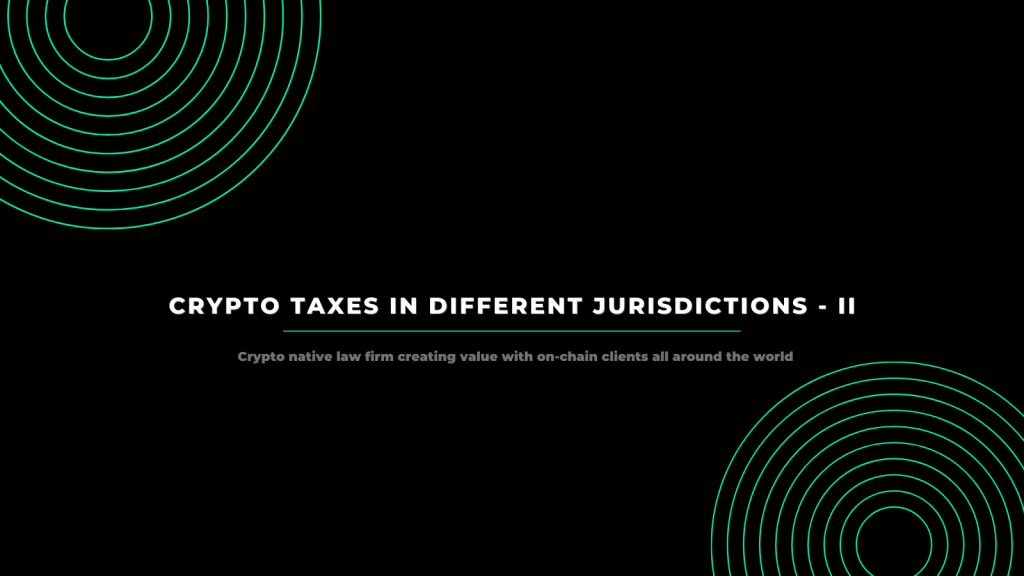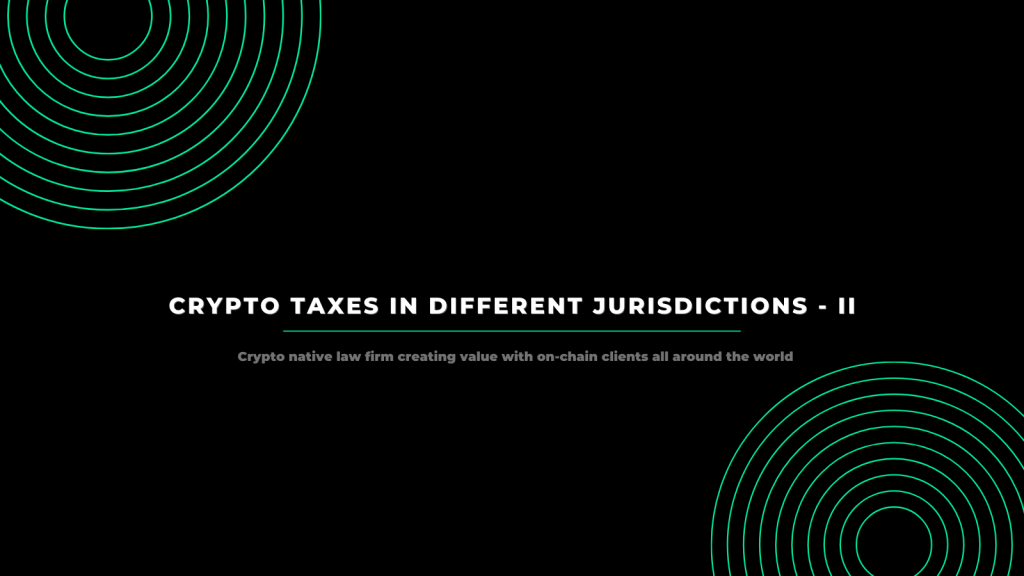Many countries have entered a busy period in tax payments, especially crypto investors, due to the arrival of the tax period. Our latest article has examined three jurisdictions, the United States, Canada, and Germany, regarding how they determine cryptocurrencies legally and approach crypto taxation.
This article examines the legal status of cryptocurrencies and their place in tax payments in general scope for other jurisdictions, Estonia and Switzerland.

1. Estonia
As per the Income Tax Act, cryptocurrencies are deemed property, and income is not generated when giving crypto as a donation, buying it for fiat money, transferring it between wallets belonging to one person, and giving it as a gift. However, it is generatable when paying cryptocurrencies in exchange for goods or services, mining, receiving as a wage, and changing cryptocurrency to another cryptocurrency or a regular currency.1 To determine how to tax virtual income, either the purchase or sale price or the gain should be converted to euros considering the market price on the date the income or cost was received.
In Estonian law, the transactions which raise profits are mandatory to declare.2 The income must be reported if a person gains income by trading, buying, selling, or exchanging it for another crypto or fiat in the 6.3. or 8.3. tables of the income tax return. It is calculated in terms of the difference between selling and purchasing price or, for exchange, the difference between the price paid for received properties and the price paid for the purchase of cryptocurrencies. According to the Income Tax Act, profits from the transfer of cryptocurrencies cannot be regarded as daily turnover since they may include unprofitable transactions.3 Cryptocurrencies are not considered securities, so losses incurred when they are exchanged cannot be claimed for tax purposes. Thus, such transactions cannot be declared. Losses resulting from transfers of securities can only be considered for taxation purposes when they meet the conditions provided by section 39 of the Income Tax Act.4
There is no need to declare cryptocurrency received as remuneration, subject to labor taxes in Estonia. However, if they invest in cryptocurrency, which was subject to labor taxes in Estonia, and benefit from that investment, then the profits of the transactions should be reported. An individual who uses cryptocurrency to pay for goods and services must declare the gain on the sale of other assets in Table 6.3 or 8.3 of their tax return. Gains from cryptocurrency transactions can be calculated by comparing the price of goods or services received with the price purchased.5
Individuals who independently engage in cryptocurrency mining and have not had income tax withheld must declare income as business income and pay taxes accordingly. The cost of equipment and electricity used to generate mining income cannot be deducted. People who permanently mine cryptocurrency must register with the Business Register as a sole proprietor or a company. Moreover, it is possible to deduct business expenses for sole proprietorships, such as equipment costs. It is important for sole proprietors to note that they cannot transfer cryptocurrency to a particular account to defer taxes.6
Company Taxes: If a person decides to begin or continue investing in cryptocurrency as a company with a legal entity, they will need to be familiar with the tax rules applicable to that entity. Companies must pay corporate taxes only when dividends are distributed. Therefore, the company is not taxed on the profits it reinvested into its business for financing its operations. The profits derived from cryptocurrencies (trading, mining, etc.) should only be subject to CIT (generally a flat 20% and can be reduced in specific cases, based on 20/80 from taxable net payment.) when distributed to shareholders. Therefore, active corporate income and passive income are excluded from CIT if there is no dividend distribution. Employee fringe benefits are subject to income tax at a rate of 20/80 and social tax at a rate of 33%.7 Cryptocurrency mining and renting storage space must be reported on Form E as a business income.8
Estonian employers must convert cryptocurrency wages into euros at the current market price and pay labour taxes on payments made to employees. Employers who have already withheld taxes from cryptocurrency wages can use the cryptocurrency as payment for goods and services without incurring further tax liabilities. Every transaction will be subject to taxation and declaration when the employee decides to reinvest taxed cryptocurrency. Dividends paid in cryptocurrency are treated at the level of the beneficiary as a dividend received in euros. Private persons do not owe tax on dividends if the company has paid income tax on them; if not, the beneficiary of the dividend needs to pay income tax in terms of an income tax return. In that case, the tax liability for the use of dividends for purchasing goods or services does not occur.9
As long as dividends are not distributed, this system attracts investors to reinvest the profits because it reduces the amount of tax leakage each year. There is no need to worry about selling investments at a loss to pay reduced taxes or transactions between different crypto that may cause taxable gains.
2. Switzerland
According to the Swiss Federal Tax Administration (“FTA”), cryptocurrencies are not legal tender. They are considered crypto-based assets (kryptobasierte vermögenswerte), which means they are deemed private wealth assets.10
Taxation in Swiss law is derived from cantons and depends on whether the person is a private investor or a self-employed trader. It is essential to receive an opinion from a professional to determine whether the person is deemed as a private investor or a self-employed to distinguish the taxes that should be paid.11
There is no capital gains tax liability if the following requirements are fulfilled; if a person holds crypto for a minimum of six months, trading turnover does not exceed five times what he is holding at the beginning of the year, has a less net capital gain than 50% of his overall income for the fiscal year, has no debt financing and derivatives are solely used for hedging. Capital gains tax occurs if a person is a self-employed trader or a business. However, being exempt from capital gains tax does not mean that income tax or wealth tax are also excluded. There are two taxes for a private investor: income tax and wealth tax.12
Buying cryptocurrencies with the traditional currency, selling, trading, or spending by a private investor, and transferring between wallets belonging to the same person are considered tax-free. However, HODLing crypto may raise wealth tax on the total amount, unlike other jurisdictions. There might also be tax deductions in specific cases, such as giving cryptos as a gift depending on the canton where the relevant person resides. Since crypto gains are tax-exempt for private investors, crypto capital losses cannot be deducted. However, self-employed traders or businesses may deduct their crypto capital losses to reduce tax.
Income tax is paid where the person earns income. Salary payments and service fee payments, mining, staking, and airdrops of crypto are subject to income tax. Income taxes form three types of taxes; federal, canton, and municipal, which introduce different rates. Therefore, income rates vary depending on the place of residence and the amount of the earnings.13
Wealth tax is the tax that applies to private wealth assets, including cryptocurrencies. The taxation value is determined by the FTA at the end of December according to the usage of the cryptocurrencies, which are determined mostly based on the average price on different exchanges, i.e., Bitcoin, Ether, etc. Therefore, tax should be declared according to these values. If the value is not determined, taxpayers should report based on the platforms used to hold the assets. Taxes should be paid according to the total value of the assets, which includes crypto.14 Crypto mining is considered a type of income; therefore, it is essential to evaluate the taxes and deductions based on the characteristics of the activities to be set by the relevant canton to determine whether the mining activity is considered the business of self-employment income.
In Switzerland, taxes are reported with the annual tax return. Taxes had to be filed by the end of March for the 2021 fiscal year. To calculate the taxes, taxable crypto transactions, the market value of the crypto assets, and transactions subject to income tax should be identified. The market value of the income should be calculated in CHF based on the date of receival. Finally, crypto income and the total value of the crypto assets should be reported to the FTA with the annual tax return. For the fiscal year of 2022, investors may follow these steps to pay fewer taxes on crypto; to avoid the capital gains tax, a person should ensure that he follows the rules to be a private investor; if he is considered a self-employed trader, he should balance capital losses with the gains. Furthermore, deduction of the taxes based on charitable activities is also an alternative to paying fewer taxes.15
Conclusion
This article examines how the two mentioned countries, Estonia and Switzerland, regulate cryptocurrencies legally and how they approach crypto taxation in general scope. For detailed information and processes, please review the explanations and necessary documents of the tax offices and agencies of the relevant countries.
As Vircon Legal, we will continue to inform you regarding crypto-related regulations and crypto taxation in different jurisdictions.
- https://www.estonia-company.ee/2021/08/02/cryptocurrency-taxation-in-estonia/
- https://www.binance.com/en/blog/markets/crypto-taxation-in-estonia-421499824684903039
- https://www.emta.ee/en/private-client/taxes-and-payment/taxable-income/cryptocurrency
- https://www.emta.ee/en/private-client/taxes-and-payment/taxable-income/cryptocurrency
- https://www.emta.ee/en/private-client/taxes-and-payment/taxable-income/cryptocurrency
- https://www.emta.ee/en/private-client/taxes-and-payment/taxable-income/cryptocurrency
- https://cryptocurrency-licence.com/blog/estonia-is-one-of-the-worlds-most-bitcoin-friendly-countries/
- https://www.emta.ee/en/private-client/taxes-and-payment/taxable-income/cryptocurrency
- https://www.emta.ee/en/private-client/taxes-and-payment/taxable-income/cryptocurrency
- https://www.estv.admin.ch/estv/fr/accueil/impot-federal-direct/informations-specialisees-ifd/cryptomonnaies.html
- https://koinly.io/guides/switzerland-crypto-tax-guide/
- https://koinly.io/guides/switzerland-crypto-tax-guide/
- https://koinly.io/guides/switzerland-crypto-tax-guide/
- https://koinly.io/guides/switzerland-crypto-tax-guide/
- https://koinly.io/guides/switzerland-crypto-tax-guide/
